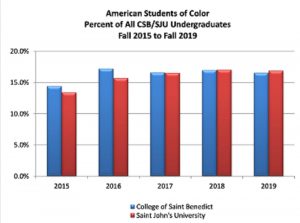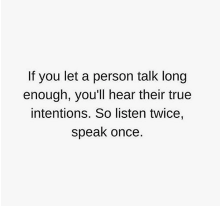A Seemingly Simple Question
“Where are you from?” is one of my least favorite questions in existence. This became evident in August 2018, during my first day of orientation at the College of Saint Benedict. As is typical of orientations, the first few hours were filled with introductions, and I watched as my future classmates rambled off names of nearby Midwest towns and cities in response to the question at hand. Still, replies of “California” and “Texas” triggered several surprised reactions of “ooh’s” and “ahh’s” from the crowd.
For context, my university sits in the middle of rural Minnesota, and in 2019 around 80% of students came from in-state. In addition, the student body is overwhelming white, at 79.7%. I say this not to criticize my university, but to highlight that if you are not white or from Minnesota (or one of its bordering states) you are certainly in the minority.
Therefore, as I arrived on campus as a white, blue-eyed girl with Wisconsin license plates, nothing seemed rare (except, perhaps, my red hair). Yet, my actual answer to the question of “Where are you from?” is quite complicated.
Transnational Movement
At the age of four, my family uprooted from Wisconsin to move to Berlin, Germany, where my parents and siblings stayed for two years. When I was six, we then moved to Dhahran, Saudi Arabia, remaining until we transitioned back to the U.S. However, I finished my last two years of high school in El Salvador and Saudi Arabia.
The long-story short is that I have spent half of my life outside of the U.S. I have lived in eight houses within four different countries. I do not say any of this to brag, boast, or claim that I have greater insight into the world, but only emphasize why the question at the top of this page is terribly complicated for me!
I also say this because having had several “homes” makes me question my role in society, as well as my future (questions most people in their 20s are asking, I suppose). Without fully knowing where I come from, I am still trying to figure out what that means for where I am going.
The Power of Human Connection
This is why I am at the Advocacy Project… or should I say partly. Having been surrounded by people of different races, religions, and hometowns from birth makes me passionate about human diversity and the power that arises when we choose to listen to others.
So often, we humans prefer to quickly judge each other rather than deeply listen. I often think it must be innate for human beings to do this. That is, label and hold prejudice, as it is easier to process our differences by simply placing each other into small boxes. Can we change the way we do this? I think yes. Does it take time, effort, and a willingness to recognize how complicated human beings truly are? I think yes. And do I think it starts by listening. Yes.
The fact that the question “Where are you from?” tries to place me into a small box that does not describe my whole life story is one example of how the single-story phenomena can be misleading. However, I also hope to recognize that being assumed a “white girl from Wisconsin” (end of story) is certainly not the worst box to be put into. It does not place me into any immediate danger or carry hurtful prejudices along with it.
But me, myself, and I know my full-life story, and I hope to recognize the privilege that comes with it. Not only being white and from a stable family, but also having been exposed to such a vast amount of diversity at a young age. My unique upbringing and flexibility of not “being” from one place, although freeing me from allegiance to one community, also makes me wonder where I am supposed to “be.” Once again, this is why I am at AP. Although I am still trying to find “my place,” I think learning from an organization that puts listening and establishing relationships at its forefront is a good place to start.
Posted By Brigid Smith
Posted Jun 23rd, 2020



7 Comments
Alexandra Mayer
June 25, 2020
Great post, Brigid. I think part of rejecting the “single story” phenomenon is understanding that we don’t necessarily have one place – geographically or metaphorically.
Iain Guest
June 28, 2020
Hi Brigid – thanks for this great blog! I think you’ve answered your own question – where are you from? Pretty impressive! Even more impressive – your journey has given you an understanding of diversity that most us will never get. You remind us that diversity, and exposure to other cultures and people, is rich and reaffirming- the exact opposite of the threat it is often made out to be. This is the positive side to the debate roiling America now and it’s not getting the press it deserves! Thanks for the reminder! Hopefully, your time at AP will give you more exposure to remarkable people and opportunity to write more great blogs.
Bobbi Fitzsimmons
June 29, 2020
Hi Brigid, I, too, moved frequently while growing up and often had difficulty with this question as well. I recently heard a quote by the artist Isamu Noguchi that really felt right to me. He said, “Because I don’t belong anywhere, I’m at home everywhere.” That’s a good feeling
Mary Ellen Cain
July 7, 2020
Brigid, as challenging as it must have been at times growing up as an American in different cultures, what a rich learning opportunity that was! You’ve obviously made the most of your upbringing and your ongoing eagerness to explore issues and possible solutions is quite evident. Looking forward to more blogs from you!
Ezoza Ismailova
July 12, 2020
Thank you providing us with a little insight into your background, Brigid! I really enjoyed reading your story. I’ve been trying to educate myself on different types of microaggressions and also found that the very same question that is your blog topic is considered a microaggression. I know the intention can be good and we are curious creatures as humans, but similar to how you said, there is more to us then the place(s) where we are from.
Beth Alexion
July 24, 2020
I think this blog is so important, Brigid, and I’m really grateful you shared it! I think your point about listening and not writing people off based on first impressions, how they look, where they work, etc is crucial, and the “long, complicated” answers to these sorts of questions are still not normalized in our society. I also think a lot about Adichie’s “Danger of a Single Story” a lot, especially as someone who is studying how data informs policy–how can policy-makers use data to make informed decisions while also not falling into this trap of making generalizations that actually obscure more than they elucidate? This is a difficult question that I don’t think gets enough attention. Sorry for the long comment, but your piece inspired a lot of thoughts!
GEORGE AND KATIE SMITH
August 3, 2020
GREAT BLOG BRIGID. I AM GLAD AND PROUD I WAS ABLE TO DISCUSS IT WITH YOU IN PERSON!